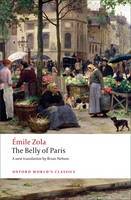Belly of Paris
- Unit price
- / per
-
Author:ZOLA Emile
-
ISBN:9780199555840
-
Publication Date:June 2009
-
Edition:1
-
Pages:320
-
Binding:Paperback
-
Publisher:Oxford World-s Classics
-
Country of Publication:


A Back Order button means that we don’t have the book in stock at our store. It may already be on order – or we can order it for you from a publisher or distributor at no additional cost.
As we source items from around the globe, a back-order can take anywhere from 5 days to several weeks to arrive, depending on the title.
To check how long this might take, you’re welcome to contact us and we can provide an ETA or any other information you need. We recommend checking the timeframe before committing to an online order.
Belly of Paris
- Unit price
- / per
-
Author:ZOLA Emile
-
ISBN:9780199555840
-
Publication Date:June 2009
-
Edition:1
-
Pages:320
-
Binding:Paperback
-
Publisher:Oxford World-s Classics
-
Country of Publication:
Description
Adding product to your cart
You may also like
A Back Order button means that we don’t have the book in stock at our store. It may already be on order – or we can order it for you from a publisher or distributor at no additional cost.
As we source items from around the globe, a back-order can take anywhere from 5 days to several weeks to arrive, depending on the title.
To check how long this might take, you’re welcome to contact us and we can provide an ETA or any other information you need. We recommend checking the timeframe before committing to an online order.
You may also like
You may also like
-
'Respectable people... What bastards!' Unjustly deported to Devil's Island following Louis-Napoleon's coup-d'etat in December 1851, Florent Quenu escapes and returns to Paris. He finds the city changed beyond recognition. The old Marche des Innocents has been knocked down as part of Haussmann's grand programme of urban reconstruction to make way for Les Halles, the spectacular new food markets. Disgusted by a bourgeois society whose devotion to food is inseparable from its devotion to the Government, Florent attempts an insurrection. Les Halles, apocalyptic and destructive, play an active role in Zola's picture of a world in which food and the injustice of society are inextricably linked. The Belly of Paris (Le Ventre de Paris) is the third volume in Zola's famous cycle of twenty novels, Les Rougon-Macquart. It introduces the painter Claude Lantier and in its satirical representation of the bourgeoisie and capitalism complements Zola's other great novels of social conflict and urban poverty.
-
-
Author: ZOLA EmileISBN: 9780199555840Publication Date: June 2009Edition: 1Pages: 320Binding: PaperbackPublisher: Oxford World-s ClassicsCountry of Publication:
'Respectable people... What bastards!' Unjustly deported to Devil's Island following Louis-Napoleon's coup-d'etat in December 1851, Florent Quenu escapes and returns to Paris. He finds the city changed beyond recognition. The old Marche des Innocents has been knocked down as part of Haussmann's grand programme of urban reconstruction to make way for Les Halles, the spectacular new food markets. Disgusted by a bourgeois society whose devotion to food is inseparable from its devotion to the Government, Florent attempts an insurrection. Les Halles, apocalyptic and destructive, play an active role in Zola's picture of a world in which food and the injustice of society are inextricably linked. The Belly of Paris (Le Ventre de Paris) is the third volume in Zola's famous cycle of twenty novels, Les Rougon-Macquart. It introduces the painter Claude Lantier and in its satirical representation of the bourgeoisie and capitalism complements Zola's other great novels of social conflict and urban poverty.-
Author: ZOLA EmileISBN: 9780199555840Publication Date: June 2009Edition: 1Pages: 320Binding: PaperbackPublisher: Oxford World-s ClassicsCountry of Publication:
-



